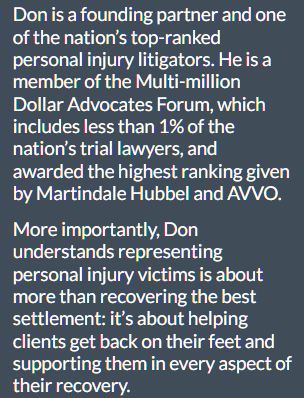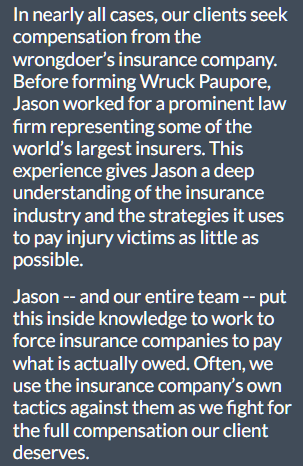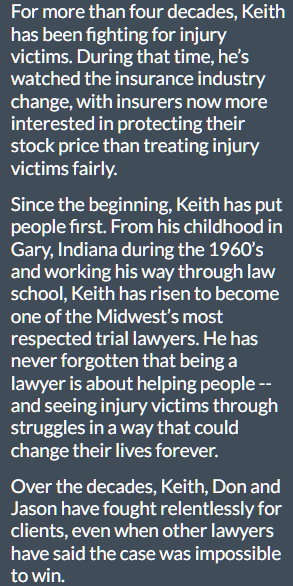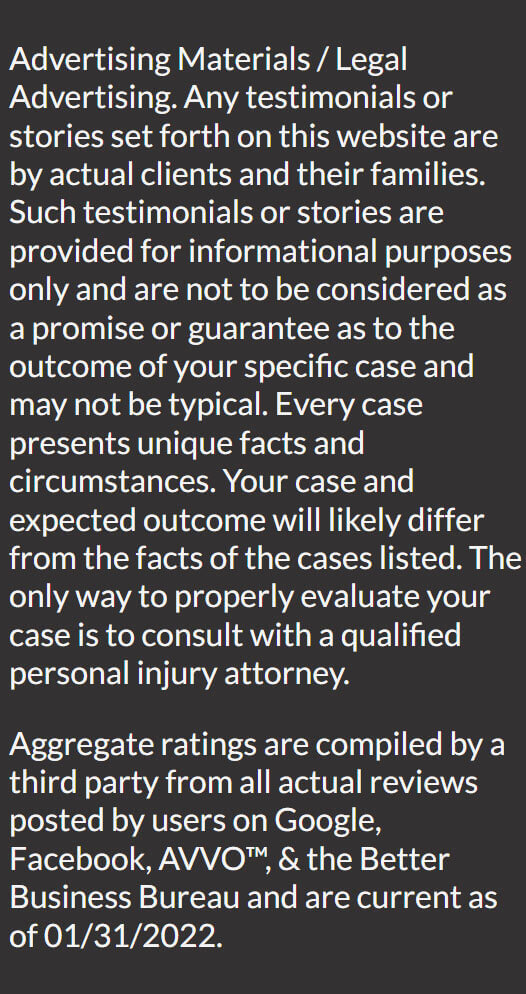



Accidents occur all the time. While some are fortunate enough to avoid serious harm, others are a lot less lucky. Even a minor accident can lead to severe harm and damage. The person or people responsible for the accident should have to pay fair compensation to the people who were injured. Our legal team can help you take legal action to get you the compensation you deserve.
First, we need to figure out who is responsible for causing the accident that led to your injuries. Was it a private individual or perhaps a business or organization? In some cases, governmental entities might be responsible for accidents, although holding them accountable can be complicated. Talk to your lawyer about when to file your claim. Personal injury claims only last for a while, and you might be unable to file your claim if you wait too long. You should also talk to your lawyer about your damages. You might have numerous economic and non-economic injuries to evaluate, and we need an accurate accounting before we file the case.
Call (219) 322-1166 and talk to our personal injury attorneys at Wruck Paupore about preparing your claims for court.
If you are injured, we need to determine who is to blame. Knowing who caused the accident and how will help us find evidence to support your claims. It is not uncommon for people to believe one person or entity is responsible only to discover later, after a careful review of the evidence, that others are also responsible.
Many cases involve accidents caused by individual people. For example, if you were injured in a car accident, one other driver might be to blame. If you were hurt in a slip-and-fall accident, the owner of the property where you fell might be held liable. In other cases, multiple people are implicated. While some car accidents involve one negligent driver, others are more complex. Several drivers might be to blame in a multi-vehicle accident, and they all should be held responsible. This is why, after any accident, exchanging information with other people involved is crucial. We need this information to track people down later and include them in your case.
Depending on where and how you were injured, a business or organization might be held responsible rather than a single person or group. For example, if you slip and fall on someone’s property because they failed to maintain it safely, they can be held liable. However, if the property is a store, restaurant, or other business, the entire business may be named in the case and held responsible. Talk to your attorney about your case if you are unsure whether you can hold a business or organization responsible.
Although it is less common than the above possibilities, government agencies or organizations might be responsible for personal injuries under certain circumstances. Holding these entities or agencies responsible is easier said than done. Not only are certain governmental entities immune from liability, but different rules might apply to the case regarding when and how it must be filed. According to I.C. § 34-13-3-8(a), you must submit a notice of your claim to the relevant governmental entity within 180 days of the cause of action. This is a very tight time limit, and you should speak to a lawyer as soon as possible.
The Tort Claims Act of Indiana defines how governmental entities may be held liable for injuries. Keep in mind that the government enjoys far more legal immunities than an ordinary person, and there may be circumstances in which you cannot hold the government responsible, even if it is entirely to blame for your injuries.
It is not unusual to be conflicted over whether to take legal action over a personal injury. While it is reasonable to take time to make up your mind, you should not take too much time, as you only have so much of it to prepare your case. Under I.C. § 34-11-2-4(a)(1), the statute of limitations allows plaintiffs only 2 years to file a personal injury case. The limitation period begins on the same day as the accident. If we cannot get the case filed on time, you risk losing the ability to file the cause of action, and you might be forever barred from getting fair compensation.
Tolling the statute of limitations may be possible under specific conditions. Tolling allows plaintiffs to pause the limitation period, giving them more time to file the case. Tolling may be available for those under “legal disabilities” at the time of the accident, according to I.C. § 34-11-6-4. A legal disability may include a condition that prevents a plaintiff from taking legal action on their own or understanding their rights. A common example is infancy. If you were under 18 when you were injured, the statute of limitations might be tolled until you turn 18, giving you until age 20 to file a case.
Your damages form the basis of your potential compensation, and the greater your injuries and losses are, the more extensive your damages may be. Accurately calculating damages is no small feat, and we need to make sure that nothing is left unaccounted for. If damages are overlooked or underestimated, you risk losing valuable compensation.
Non-economic damages are related to your unique experiences from your injuries. Often, these experiences do not cost money, but plaintiffs may still be entitled to substantial compensation. You might claim damages related to the intense pain of your injuries, tumultuous emotional distress, humiliation, and the loss of enjoyment of your own life.
Economic damages are rooted in money. Accidents and injuries can be very expensive, and you should claim the money you lost as part of your damages. For example, your hospital bills might be astronomical, especially if you need extensive treatment. You might also claim damages related to lost or destroyed property. If you cannot go back to your job because of your injuries, you might claim damages for the income and wages you lose.
Call (219) 322-1166 and talk to our personal injury attorneys at Wruck Paupore about preparing your claims for court.
Don is a founding partner and one of the nation’s top-ranked personal injury litigators. He is a member of the Multi-million Dollar Advocates Forum, which includes less than 1% of the nation’s trial lawyers, and awarded the highest ranking given by Martindale Hubbel and AVVO.
More importantly, Don understands representing personal injury victims is about more than recovering the best settlement: it’s about helping clients get back on their feet and supporting them in every aspect of their recovery.

In nearly all cases, our clients seek compensation from the wrongdoer’s insurance company. Before forming Wruck Paupore, Jason worked for a prominent law firm representing some of the world’s largest insurers. This experience gives Jason a deep understanding of the insurance industry and the strategies it uses to pay injury victims as little as possible.
Jason -- and our entire team -- put this inside knowledge to work to force insurance companies to pay what is actually owed. Often, we use the insurance company’s own tactics against them as we fight for the full compensation our client deserves.

For more than four decades, Keith has been fighting for injury victims. During that time, he’s watched the insurance industry change, with insurers now more interested in protecting their stock price than treating injury victims fairly.
Since the beginning, Keith has put people first. From his childhood in Gary, Indiana during the 1960’s and working his way through law school, Keith has risen to become one of the Midwest’s most respected trial lawyers. He has never forgotten that being a lawyer is about helping people -- and seeing injury victims through struggles in a way that could change their lives forever.
Over the decades, Keith, Don and Jason have fought relentlessly for clients, even when other lawyers have said the case was impossible to win.


© 2025
Terms of Service | Privacy Policy | Resources | Blog | Sitemap

© 2022 Wruck Paupore PC
Terms of Service | Privacy Policy